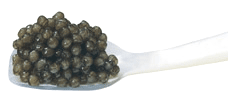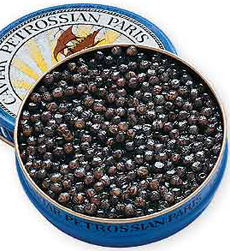
January 2006
|
 |
Caspian Caviar Update
News About The World’s Favorite Roe
Millions of years old, in just forty years the beluga sturgeon has come to the brink of extinction. Ninety percent of them live in the Caspian Sea, the word’s largest salt-water lake, which is bordered by Iran and the former Soviet socialist republics of Azerbaijan, Kazakhstan, Russia, and Turkmenistan. The other major source is the Black Sea, which is bordered by Russia and Romania.
The beluga (beluga means white in Russian) can grow up to 30 feet long and weigh up to 3,300 pounds; up to 15% of the female’s body weight can be roe. Despite that, the caviar is rare: the species is not plentiful and although it can live for 200 years, the female does not mature to produce roe for 18 to 20 years. Its scarcity, and the demand for its soft, buttery and delicate eggs, makes it the world’s most expensive caviar.
Its smaller cousins, the 440-pound osetra sturgeon and the 175-pound sevruga sturgeon, are also on the Endangered Species List.
What has driven these most desired of fish to extinction? Not legal harvesting, but man-made problems:
- The damming of the Volga River spawning grounds 40 years ago, leaving the ancient fish with no place to reproduce (there has been almost no natural spawning in the Caspian by the sturgeon in 20 years).
- Pollution, including destructive drilling connected with the Caspian oil boom.
- Excessive illegal poaching, causing over-fishing. Until recent decades, it was not unusual for a sturgeon to live 200 years and grow to weigh a ton. Today, according to Georgy Ruban, an expert with the nongovernmental International Union for the Conservation of Nature, few live beyond their first spawning at age 10. The sturgeon, he says, are being fished ruthlessly out of existence, mainly by poachers.
As a result, countries are banding together to save the Caspian sturgeon by banning the import of the caviar. It became illegal to import or bring personal supplies of beluga into the U.S. on October 1, 2005, although sevruga and osetra were not banned. However, in a more severe move, as of January 2, 2006, ten nations that actively export caviar—Azerbaijan, Bulgaria, China, Iran, Kazakhstan, Romania, Russia, Serbia and Montenegro, Turkmenistan, and Ukraine—have been told to halt exports of all three Caspian caviars by the Convention on International Trade in Endangered Species (CITES, comprised of 169 member nations). The main importing nations (in addition to the U.S., which already has blocked imports, Great Britain, France, German, Japan, and Switzerland) are expected to follow CITE’s directive to block imports.
One benefit to the suspension of caviar exports is that it will cut down on the poaching. Black market caviar is often repackaged through intermediaries as legal caviar, commingled, packed and shipped under the same labels. With all exports terminated, illegal caviar has no market. Some sources estimate the illegal catch to be as large or larger as the legal harvest.
The Convention covers exports only, which means that fish caught in each country can still be processed for caviar to be sold domestically. Caviar from Iran is exempted from the ban. Iran is considered by CITES to practice effective conservation and policing of its fisheries. But Iran is a small player in the caviar business, with an annual harvest one-seventh the size of Russia’s.
“The moratorium will give a little temporary breathing room to the sturgeon, but unless there is a comprehensive environmental plan for the Caspian Sea, [the beluga sturgeon] are probably doomed," said Vladimir Logutov, chief Caspian expert for the Ecology Committee of Russia's State Duma (the lower house of Parliament).”
Companies can sell their stocks of caviar until they are depleted. With a shelf life of 18 months, those that have planned ahead will be able to keep their customers happy for a while, while more serious minds ponder the fate of the poor beluga, sevruga and osetra sturgeons. Farmed sturgeon caviars from all over the world are available (the U.S. does a good business in them, as do Italy, France, Romania and Uruguay); and other fish roes will have to take up the slack. |
 |
Daniel Boulud Private Stock Beluga from
Browne Trading Company. |
Lifestyle Direct Direct, Inc. All rights reserved. Images are the copyright of their individual owners.

|



